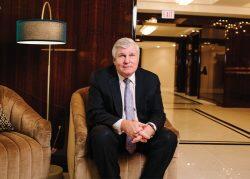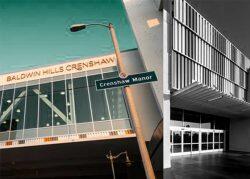If Quintin Primo hadn’t launched a nonprofit that blazed real estate paths for Black and Latino people in 2003, Chicago’s office market within the Loop could be facing a significant gap coming out of the pandemic.
Instead, the Capri Investment Group executive chairman forged a connection with Mike Tabb through the Real Estate Executive Council, the entity focused on career development in communities of color. That led to a surprising 1.2 million-square-foot commitment from Google, which plans to renovate and occupy the dilapidated Thompson Center in a move that holds the potential to give a major boost to the LaSalle Corridor in the Central Loop.
Primo convinced Tabb, Google’s property guru, to sway the tech giant into purchasing the entire Thompson Center for its Chicago expansion, and allow Primo and partner Mike Reschke to undertake the massive renovation necessary for a 2026 move-in.
“After a tour of four or five properties, Mike [Tabb] told me, ‘You were right about the building, the Thompson Center is the most intriguing and interesting for us but it probably has the least chance of getting done,’” Primo said. But the building’s history as a civic center and the chance for Google to change the tide of the city’s office market were the appeals that cemented the deal.
While it’s being hailed as a boost for the Windy City and a bridge to the central Loop’s renaissance, Primo admits he doesn’t always win. Perhaps most notably, a fund he controlled sold the Los Angeles Baldwin Hills Crenshaw Plaza last year after two previous scuttled deals. The property fetched $111 million, according to published reports – $25 million below the price Primo paid 15 years earlier, even after $35 million was spent on improvements. And also after it gained approval to add 1,000 apartments on the property following a long fight with the community.
His attitude embodies his favorite Winston Churchill quote on defining success, “going from failure to failure without loss of enthusiasm.” The 67-year-old, who graduated from high school in Chicago’s south suburbs, sat down with The Real Deal at the Peninsula Hotel near his Gold Coast home to discuss his professional journey, his relationship with Reschke, the Google deal and more.
This interview has been edited for space and clarity.
How did you meet Mike Reschke and what led to your Thompson Center partnership?
We have been friends and associates for many years and we’ve looked at a lot of things to do together, many of which did not come to fruition. But we had talked about the Thompson Center a while back, as it was being speculated that the state would sell it. Mike is very active in the LaSalle corridor, and we actually worked with him on his hotel at 208 South LaSalle, providing equity financing for the entire project.
[For] the Thompson Center, we had a number of meetings, and for a number of reasons we decided not to pursue it with him. I said, ‘Listen, why don’t you win it first? I don’t have a great deal of patience or tolerance for RFPs, but if you win it let’s sit down and see how we could be of assistance.’ Traditionally, we have been a capital provider, lending to Reschke and other major developers across the country. But over the last five to seven years we’ve slowly become much more of a developer making principal investments as opposed to investments on behalf of institutional clients, pension funds and others. So this transition for the firm first began at a project in Los Angeles called Baldwin Hills Crenshaw.
I’m glad you brought up Baldwin Hills. Was that a hard project for you to move on from after fighting eight years to get entitlements for redevelopment?
Unfortunately the asset was in a fund and when the fund comes to the end of its natural life after agreed-to extensions, you have to sell the assets. And so we had to. A third party was hired to sell the asset. We had an interest in buying the asset ourselves, but we were not the successful bid. So we sold it.
It came at a difficult time during the pandemic. Were you extending concessions to the tenants in that property to try to get them through the crisis?
Retail malls almost without exception across the United States have suffered from the advent of the internet. So you had that headwind and Baldwin Hills was not unique in fighting that. But then on top of that, you had two to three years of the [pandemic’s] impact. We survived because we had so little leverage, and we did that purposely. We deleveraged over many years because of the uncertainty. As we talked with many prospective investors, kind of like the Thompson Center, Baldwin Hills was more than simply an asset. It was the center of the Baldwin Hills Crenshaw community in so many different ways. At Capri, we’ve always gravitated toward large, complex investments that we try to limit the downside risk and maximize the upside, so Baldwin Hills, the Thompson Center, these transactions are par for the course.
In 2019, one of your Capri ventures lost management of Illinois Teachers’ Retirement System’s $1 billion real estate portfolio, right after losing an investment from the Los Angeles County Employees Retirement Association. What were those conversations like and is that significant for your business?
Yes it is.
I’ve been in the real estate industry for 43 years. I’ve seen numerous cycles. I’ve benefited in the up times and taken it on the chin from time to time. Capri, which is now in its 30th year of business, has had many failures, too many. But we’ve also had some magnificent successes. As long as the trend is generally up, even though it may have downturns, you’ll be in good shape. As we have transitioned from a traditional investment manager to a principal investor and developer, there have certainly been many challenges.
Things don’t always go as planned. Who would’ve thought after having assets redeemed as a pension investment advisor, we would land one of the most significant transactions in the city and perhaps the United States?
What’s your outlook on what Mayor Lori Lightfoot’s administration has done for real estate, and her attempt to scale back City Council’s deference to the local alderman over development decisions in their wards?
Best of luck with getting rid of that. I don’t see it disappearing and I really don’t believe it should, honestly.
I think like any mayor, Mayor Lightfoot has learned on the job. Rarely do you have mayoral experience when you become a mayor. She started in the teeth of the pandemic and had to address all the economic and social issues literally from day one. But I think she’s done a magnificent job and I think she will be even better in her second term, which I am sure she will take. She brought on [Department of Planning and Development Commissioner] Maurice Cox, who I think is brilliant, and really cares about what goes on in the city. He’s very opinionated, and that’s OK. There’s no one in my business who’s not opinionated.
Read more


CORRECTION, 11:35am, 9/2/2022: This story has been corrected to show Primo’s updated title in the subheadline and second paragraph.
